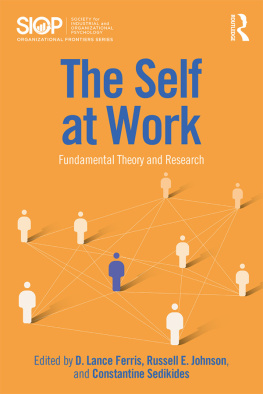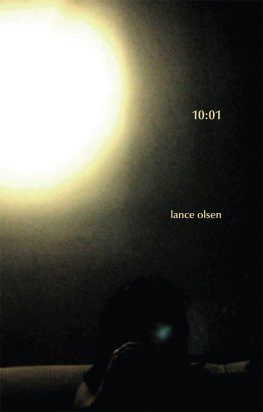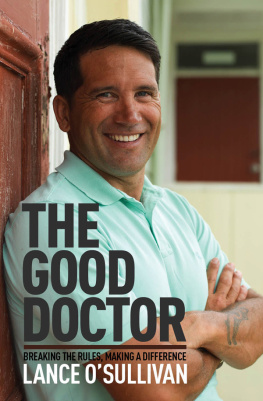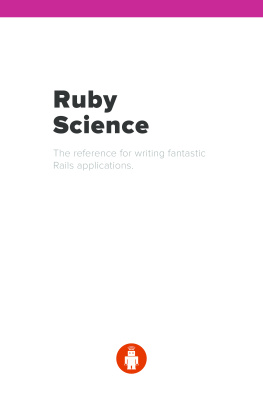
p.i
THE SELF AT WORK
The Self at Work brings researchers in industrial and organizational psychology and organizational behavior together with researchers in social and personality psychology to explore how the self impacts the workplace. Covering topics such as self-efficacy, self-esteem, self-control, power, and identification, each chapter examines how research on the self informs and furthers understanding of organizational topics such as employee engagement, feedback-seeking, and leadership. With their combined expertise, the chapter authors consider how research on the self has influenced management research and practice (and vice-versa), limitations of applying social psychology research in the organizational realm, and future directions for organizational research on the self. This book is a valuable resource for researchers, graduate students, and professionals who are interested in how research on the self can inform industrial/organizational psychology.
D. Lance Ferris is Associate Professor of Management in the Broad College of Business at Michigan State University, USA.
Russell E. Johnson is Associate Professor of Management in the Broad College of Business at Michigan State University, USA.
Constantine Sedikides is Professor and Director of the Centre for Research on Self and Identity at the University of Southampton, UK.
p.ii
Just as the self is foundational to our personal understanding of how we connect to the world, so The Self at Work will become foundational to our scholarly understanding of what it means to be in the workplace.
Blake Ashforth , Horace Steele Arizona Heritage Chair and Professor of Management, Arizona State University, USA
The editors have assembled a dynamite volume that will be the definitive source for understanding the human self in the workplace. Packed with information and rich with diverse perspectives, the book covers many vital aspects of workplace behaviour, including task performance, decision-making, unethical behaviour, striving for improvement, personnel evaluation, identification with the company, colleague relationships, leadership, blame time, workplace aggression, organizational culture, alcohol and drug abuse, and impression management. Anyone interested in the psychological dynamics of organizations and work will find this book an invaluable addition to his or her library.
Roy F. Baumeister , Francis Eppes Eminent Scholar and Professor of Psychology, Florida State University, USA; author of New York Times bestseller Willpower
The Self at Work presents a broad and inclusive view of self research and self theory as applied to the workplace. Topics from self-esteem and self-efficacy to narcissism and even cultural models of the self are included. The theory and research brought together in this volume have the potential to drive a full decade of research.
W. Keith Campbell , Professor of Psychology, University of Georgia, USA
The Self at Work is an impressive and timely volume on an important topic. Understanding identity processes in work contexts has emerged as a cutting-edge area of study across a number of perspectives (e.g., employee, supervisor, organization). This volume brings together the writings of eminent scholars who have studied various aspects of the self at work. It is sure to be a valuable resource for anyone interested in state-of-the-science reviews on essential topics in this field.
David V. Day , Professor of Psychology and Academic Director of the Kravis Leadership Institute, Claremont McKenna College, USA
p.iii
SIOP Organizational Frontiers Series
The Organizational Frontiers Series is sponsored by the Society for Industrial and Organizational Psychology (SIOP). Launched in 1983 to make scientific contributions accessible to the field, the series publishes books addressing emerging theoretical developments, fundamental and translational research, and theory-driven practice in the field of Industrial-Organizational Psychology and related organizational science disciplines including organizational behavior, human resource management, and labor and industrial relations.
Books in this series aim to inform readers of significant advances in research; challenge the research and practice community to develop and adapt new ideas; and promote the use of scientific knowledge in the solution of public policy issues and increased organizational effectiveness.
The Series originated in the hope that it would facilitate continuous learning and spur research curiosity about organizational phenomena on the part of both scientists and practitioners.
The Society for Industrial and Organizational Psychology is an international professional association with an annual membership of more than 8,000 industrial-organizational (I-O) psychologists who study and apply scientific principles to the workplace. I-O psychologists serve as trusted partners to business, offering strategically focused and scientifically rigorous solutions for a number of workplace issues. SIOPs mission is to enhance human well-being and performance in organizational and work settings by promoting the science, practice, and teaching of I-O psychology. For more information about SIOP, please visit www.siop.org.
p.iv
SIOP Organizational Frontiers Series
Series Editor
Richard Klimoski
George Mason University
EDITORIAL BOARD
Neal M. Ashkanasy
University of Queensland
Jill Ellingson
University of Kansas
Ruth Kanfer
Georgia Institute of Technology
Eden King
George Mason University
Fred Oswald
Rice University
Stephen Zaccaro
George Mason University
Deborah Rupp
Purdue University
Mo Wang
University of Florida
Gilad Chen
University of Maryland
p.v
SIOP Organizational Frontiers Series
Series Editor
Richard Klimoski
George Mason University
Ferris/Johnson/Sedikides: (2018) The Self at Work
Ellingson/Noe: (2017) Autonomous Learning in the Workplace
Ashkanasy/Bennett/Martinko: (2016) Understanding the High Performance Workplace: The Line Between Motivation and Abuse
King/Tonidandel/Cortina; (2014) Big Data at Work: The Data Science Revolution and Organizational Psychology
Finkelstein/Truxillo/Fraccaroli/Kanfer; (2014) Facing the Challenges of a Multi-Age Workforce: A Use-Inspired Approach
Coovert/Foster Thompson; (2013) The Psychology of Workplace Technology
Highhouse/Dalal/Salas; (2013) Judgment and Decision Making at Work
Cortina/Landis; (2013) Modern Research Methods for the Study of Behavior in Organizations
Olson-Buchanan/Koppes Bryan/Foster Thompson; (2013) Using Industrial Organizational Psychology for the Greater Good: Helping Those Who Help Others
Eby/Allen; (2012) Personal Relationships: The Effect on Employee Attitudes, Behavior, and Well-being
Goldman/Shapiro; (2012) The Psychology of Negotiations in the 21st Century Workplace: New Challenges and New Solutions
Ferris/Treadway; (2012) Politics in Organizations: Theory and Research Considerations.
Jones; (2011) Nepotism in Organizations
Hofmann/Frese; (2011) Error in Organizations
p.vii
THE SELF AT WORK
Fundamental Theory and
Research
Edited by D. Lance Ferris,
Russell E. Johnson, and
Constantine Sedikides

p.viii
First published 2018
by Routledge
711 Third Avenue, New York, NY 10017
and by Routledge
2 Park Square, Milton Park, Abingdon, Oxon, OX14 4RN
Next page













